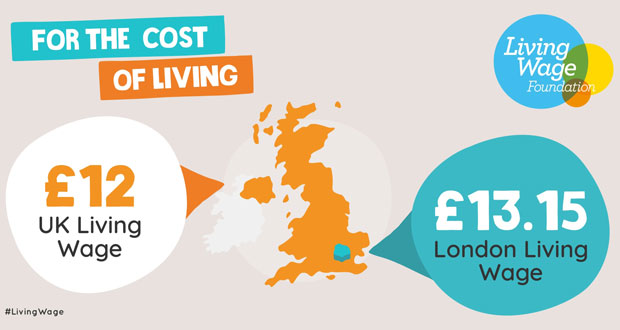People working for real Living Wage Employers throughout the country are set for a vital cost-of-living pay boost, as the Living Wage Foundation’s real Living Wage rates rise to £12 an hour across the UK (£1.10 increase), and £13.15 an hour in London (£1.20 increase).
Unlike the Government minimum wage (‘National Living Wage’ for over 23s – £10.42) the real Living Wage is the only wage rate independently calculated based on rising living costs and applies to everyone over 18. This year the rate increased by 10 per cent in the UK, reflecting persistently high costs for low paid workers.
There are 3.5 million jobs (12.2 per cent of employee jobs, or one in eight jobs) paid less than the real Living Wage. According to Living Wage Foundation projections, the scale of low pay is predicted to increase to 4.3 million (15.7 per cent of jobs) in 2023.
Recent research by the Living Wage Foundation shows that despite inflation easing, the cost-of-living crisis is far from over for Britain’s low paid workers, with 50 per cent worse off than a year ago. Forty-three per cent of low paid workers reported regularly using a foodbank (at least once per month), 60 per cent have used a foodbank in the past year and 39 per cent reported falling behind on household bills.
In the past two years record numbers of employers have signed up to pay the real Living Wage, including to their third party contractors like cleaners and security guards, with one in nine employees now working for an accredited Living Wage Employer.
There are now 14,000 Living Wage Employers, who are choosing to pay the real Living Wage to provide workers and families with greater security and stability, and over 100 Living Hours employers, going beyond payment of the real Living Wage to also provide a guaranteed minimum of 16 hours work a week, a month’s notice of shift patterns and a contract that reflects hours worked.
Katherine Chapman, Living Wage Foundation Director, said: “As inflation eases, we cannot forget that low paid workers remain at the sharp end of the cost of living crisis. Low paid workers continue to struggle with stubbornly high prices because they spend a larger share of their budget on food and energy. These new real Living Wage rates are a lifeline for the 460,000 workers who will get a pay rise .
“During these tough economic times, it is heartening that record numbers of employers are signing up to join the Living Wage movement, protecting everyone who works for them – including cleaners -from rising prices and seeing the benefits of a more motivated and engaged workforce. The real Living Wage has never been more important and we encourage those who can to join the 14,000 Living Wage employers across the UK who are committed to always pay a wage that covers the cost of living.”
Mike Bullock, CEO, Corps Security commented: “I wholeheartedly support the announcement regarding the enhancement of the Real Living Wage. It is an essential step towards addressing the cost-of-living crisis that continues to impact many of the UK’s low-paid workers. The fact that 60 per cent of individuals earning below the Real Living Wage have had to rely on food banks in the past year, with 39 per cent regularly skipping meals due to financial constraints, is a stark reminder that this increase is a lifeline for countless individuals and families striving to make ends meet.
“As a Living Wage Employer, Corps Security has been a proud supporter of the Real Living Wage and we are committed to doing our part in ensuring that our employees receive fair pay. We have a collective responsibility as employers to provide our colleagues with the means to improve their quality of life. There is a business case, too. When employees are paid a decent wage, they are more productive, loyal, and dedicated, simply because they feel valued. Also, they can focus more on their work rather than worrying about their personal finances. Not only will this increase help to attract and retain the best people, but it’s the right thing to do, particularly given the pressures of modern-day life.”
Planned, proactive maintenance is a keystone of every FM strategy. However, with current cost constraints, there are many demands on Facilities Managers’ maintenance budgets. When it comes to drainage and plumbing, however, the expense of repairing blockages or dealing with flooding could vastly exceed the cost of preventative maintenance.
Given your role as an FM Professional, we would love to hear your views, challenges & experiences, and opinions on drainage & plumbing within the workplace.
The survey will take just five minutes to complete and offers the chance to win an Amazon Gift Card Worth £100.
Take the survey here.





